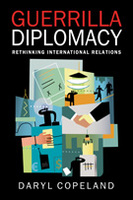Daryl Copeland, Guerrilla Diplomacy: Rethinking International Relations
(Boulder, CO: Lynne Rienner Publishers, 2009)
“A rich argument spiced by Copeland’s years of experience on the ground…. It puts forward an inescapable challenge with which scholars and practitioners alike will have to grapple as they attempt to define a role for diplomacy in the future of international relations.”
Review
Daryl Copeland presents the case for a new approach to international relations in the form of guerrilla diplomacy. The use of force in the first decade of the twenty-first century, particularly in Iraq and Afghanistan, has demonstrated limitations in the approach adopted particularly by Blair and Bush and the coalition of willing participants. Guerrilla Diplomacy presents an alternative approach to the challenges of contemporary international relations and a call to reinvigorate diplomacy.
 The new guerrilla diplomats envisaged by Daryl Copeland are no longer seen just dealing with representatives of other governments but comfortably navigating local traditions and numerous environments to engage a wider range of actors and NGOs. With physical and virtual barriers being erected to prevent citizens engaging directly with embassy staff, the options are to hunker down in mini “green zones†or become nimble enough to operate beyond the concrete barriers and automatic weapons. The guerrilla diplomat should “swim with comfort and ease in the sea of the people rather than flop around like a fish out of water, and prefer to mix with the population rather than mingle with colleagues inside the embassy wallsâ€.
The new guerrilla diplomats envisaged by Daryl Copeland are no longer seen just dealing with representatives of other governments but comfortably navigating local traditions and numerous environments to engage a wider range of actors and NGOs. With physical and virtual barriers being erected to prevent citizens engaging directly with embassy staff, the options are to hunker down in mini “green zones†or become nimble enough to operate beyond the concrete barriers and automatic weapons. The guerrilla diplomat should “swim with comfort and ease in the sea of the people rather than flop around like a fish out of water, and prefer to mix with the population rather than mingle with colleagues inside the embassy wallsâ€.
What is worthy of note is that some responses to guerrilla diplomacy have comprised the incongruous pairing of (a) assertions that foreign ministries are already engaged in this activity, and (b) an insistence that it will not work within the organizational culture of an embassy. All of which suggests that Copeland has hit a raw nerve with his clarion call for a new form of diplomat. Many have observed the changing world in which public diplomats operate; few have articulated at any length how embassy staff should respond. In articulating a response to globalization, Copeland demonstrates the extent to which contemporary diplomacy does not utilize the full range of options. Even for those who disagree with the image of guerrilla-in-diplomat’s-clothing, the book makes a strong argument that diplomacy is not currently configured for optimal results.
The book, for good or ill, is not ivory-towered scholarship – it is a rich argument spiced by Copeland’s years of experience on the ground. As a result it puts forward an inescapable challenge with which scholars and practitioners alike will have to grapple as they attempt to define a role for diplomacy in the future of international relations.
Read the full review in the Journal of American Studies (2010)